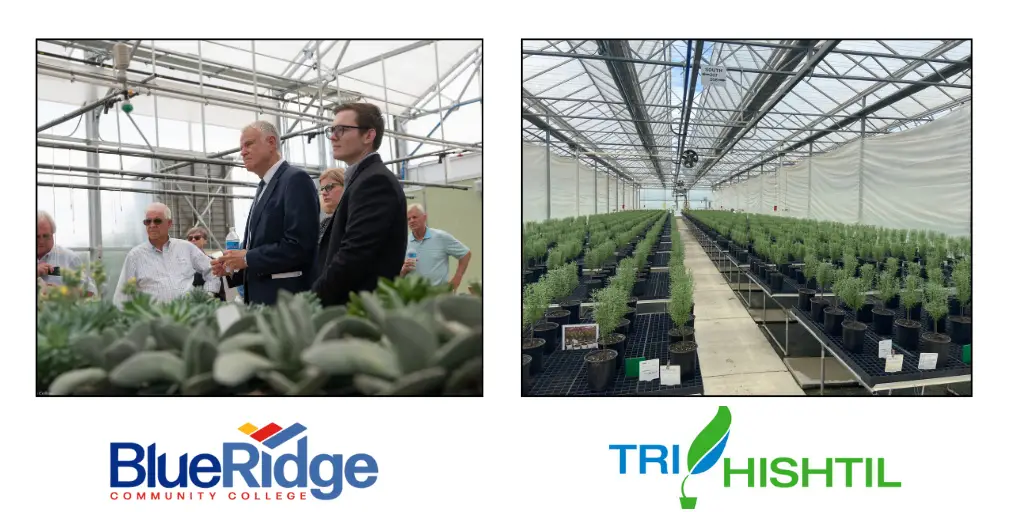The horticultural industry in Western North Carolina is booming, driving both economic growth and workforce demand. To meet this need, the Golden LEAF Foundation has funded projects to help with both the training and infrastructure required to prepare the next generation of skilled professionals to strengthen the state’s number one industry, agriculture.
The Golden LEAF Foundation Board of Directors awarded $1 million to Blue Ridge Community College through the Community-Based Grants Initiative to support the construction of a state-of-the-art teaching greenhouse. This facility expands BRCC’s agriculture programs and addresses emerging workforce needs in Western North Carolina, where more than 100 farmers already were using automated greenhouse systems and 70 skilled positions remained unfilled.
Now complete, the greenhouse is more than a growing space, it is a multidisciplinary learning environment preparing students for the region’s most in-demand jobs.
Dr. Laura Leatherwood, President of Blue Ridge Community College, described the new facility as transformative.
“Since breaking ground in 2024, the vision of a modern, high-tech greenhouse at Blue Ridge has taken shape, made possible by Golden LEAF’s generous support,” said Dr. Leatherwood. “This is more than a greenhouse; it’s a multidisciplinary learning environment that reflects the realities of today’s agricultural industry. Students in horticulture and agribusiness will work alongside those in IT, cybersecurity, engineering, and skilled trades in an environment that mirrors today’s interconnected workforce.”
She highlighted advanced features including smart environmental controls, predictive weather technology, motorized shade curtains, and automated irrigation systems, all of which give students real-world training on industry-standard technology.
Dr. Connie Wolfe, BRCC Executive Vice President for Programs, emphasized how the greenhouse strengthens student learning and supports the state’s largest industry.
“With agriculture as North Carolina’s number one industry, this facility will serve as an important tool in equipping the next generation of professionals,” said Dr. Wolfe. “Students will gain access to a living laboratory where they can apply classroom learning to real-world situations, test new approaches to sustainable agriculture, and refine their skills in ways that directly benefit agribusiness across the region.”
For Rachel Meriwether, BRCC Horticulture Program Lead Instructor, the hands-on experience is what makes this facility invaluable to students and employers alike.
“Golden LEAF funding has been transformational in terms of what we can teach,” said Meriwether. “Controlled environment agriculture requires skills in irrigation, pest management, crop timing, and technology integration that are completely different from traditional agriculture. This greenhouse allows students to experience those realities firsthand, preparing them to step into careers that are worth having and that will sustain them long-term.”
Meriwether also highlighted the strong partnerships with local agribusinesses that ensure students’ training aligns with employer needs. BRCC works with major greenhouse producers such as Costa Farms, Van Wingerden, and Tri-Hishtil, as well as mid-sized growers like Plantier Station and a range of gardens including the Biltmore Estate, the North Carolina Arboretum, and the Asheville Botanical Garden. These partnerships, combined with industry input through advisory committees, keep BRCC’s programs aligned with emerging needs, from drone technology to AI-driven crop monitoring.
With demand for skilled workers in controlled environment agriculture on the rise, the Blue Ridge greenhouse is positioning graduates for success while supporting the vitality of local farms and agribusinesses.
“This facility is more than a building, it’s a hub for collaboration, innovation, and hands-on learning that will prepare students for the interconnected workforce of today and tomorrow,” said Dr. Leatherwood.
One of the employers and collaborators in the region is Tri-Hishtil. The Golden LEAF Board awarded $200,000 through the Open Grants Program to the Cane Creek Water and Sewer District – Henderson County to construct wastewater infrastructure critical to the location of Tri-Hishtil, a company that produces grafted vegetable plants.
“AgHC, an organization in Henderson County that helps bring in agricultural operations to the area, was able to connect the Golden LEAF Foundation to our needs,” said Tri-Hishtil General Manager Bert Lemkes. “We knew our business would be growing, so it was essential for us to have the ability to expand our operations for the future. The large sewer capacity has helped enable that growth.”
While the operation started with only 15 employees, it has grown over the past 10 years to more than 250 employees during its peak season, said Lemkes.
“Our products are shipped throughout the nation,” said Lemkes. “We are growing our economic footprint. Our operations grew 20% last year, and the year before that, we had 30% growth.”
Grafted plants are more disease resistant, reduce input costs, meet demand for a production option to counter recent fumigant restrictions, limit crop rotation and associated expenses, and enable production on farms facing soil challenges.
“One of the main benefits of grafted plants is that you can get much higher production per acre,” said Lemkes. “Growers can continue to increase their yield throughout the growing season. They see more fruit per plant.”
Lemkes also serves on the statewide Plant Sciences Initiative Growers Advisory Council.
“The Plant Sciences Initiative provides growers with a sidelines view of scientists working in a multifaceted approach to improving plant production,” said Lemkes. “At PSI, they are dealing with the big issues of disease detection, resistance, yield growth, all with new technologies and across multiple specialties. It will help producers with existing and new issues for years to come.”
From investing in modern training facilities like the Blue Ridge Community College’s teaching greenhouse to supporting infrastructure that has enabled companies like Tri-Hishtil to thrive, Golden LEAF is committed to fueling long-term growth in Western North Carolina’s agribusiness sector. These efforts not only provide students with pathways to high-demand careers but also ensure that local employers have the skilled workforce they need to remain competitive.

